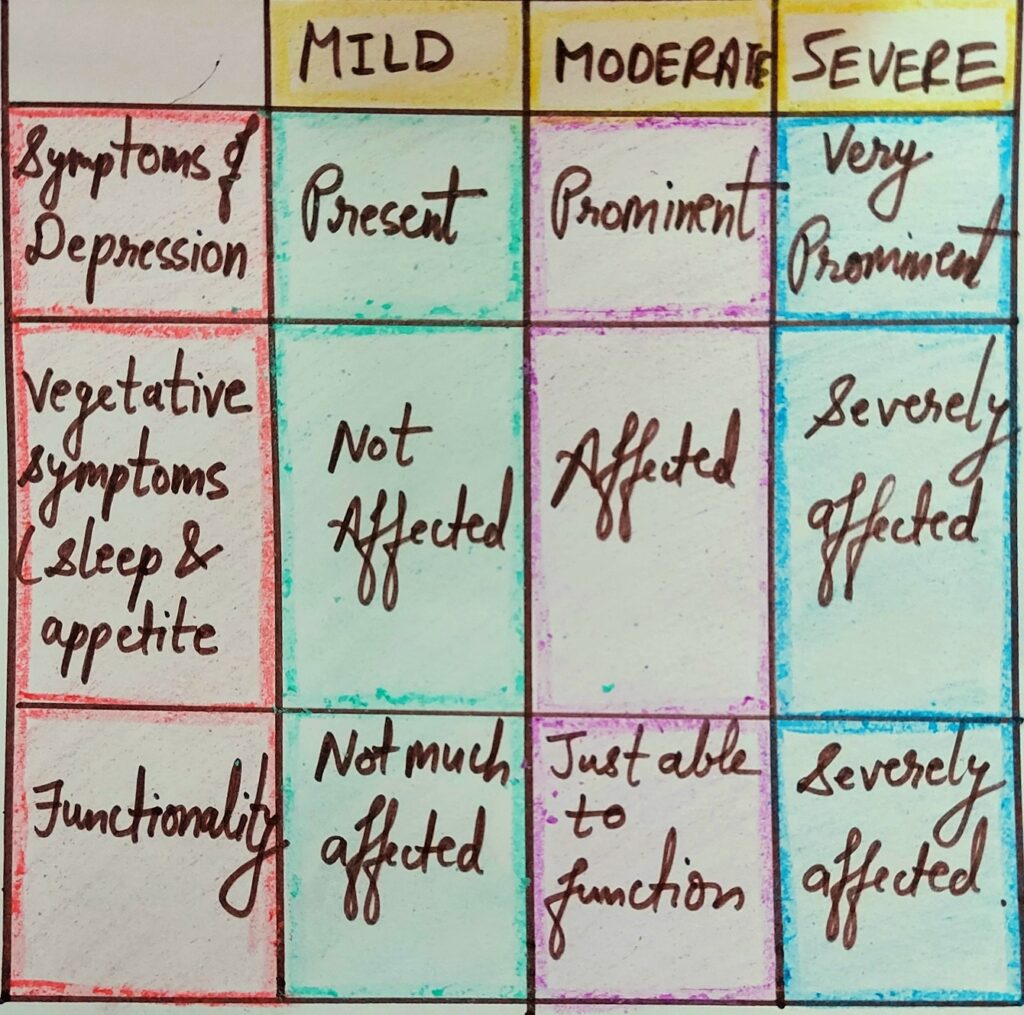DEPRESSION IN EVERYDAY LIFE
- BY DR AK RANA
Depression has become a word used in daily life. It might look easy but it breaks people from within.
DALY(Disability adjusted life years) that tells about burden of disease in community is maximum for Depression.
VARIOUS ASPECTS OF DEPRESSION
- Single episode of depression in life.
- RDD (Recurrent Depressive Disorder)- patients have 2 or more episodes of depression.
- Persistent depressive disorder – very mild sadness for greater than 2 years called Dysthymia.
Chronic major depression- Depression persisting for greater than 2 years.
- Seasonal Affective Disorder (SAD) – Person’s depression is associated with a particular season, usually it is winter.
- Pre-menstrual dysphoric disorder
In some, before menstruation there occurs low mood state which affects the quality of life and hinders proper functioning.
SYMPTOMS OF DEPRESSION
According to DSM, 5 out of 9 following features are required to diagnose depression.
Out of which either depressed mood or anhedonia (loss of interest) must be present.
- Anhedonia– loss of interest in previously pleasurable activities.
- Depressed mood (more than 2 weeks of sadness)
- Unnecessary/ too much guilt – pathological guilt.
- Lack of energy – feeling tiredness all time.
- Early morning awakening is seen.
- Decreased attention in work or anything.
- There is decreased appetite and furthermore weight loss.
Significant weight loss is characteristic of depression that is at least 5% decrease in ideal body weight in 6 months.
- Psychomotor activity like retardation/ agitation.
- Suicidal thoughts.
GRADING OF DEPRESSION ACCORDING TO ICD11 –

ATYPICAL DEPRESSION
This is other type of depression-
It is associated with hypersomnia, obesity, and increased carbohydrate craving with increased eating pattern.
Leaden paralysis is seen that is sense of feeling heavy and because of which they don’t move around.
They become upset over small things. There is increased interpersonal sensitivity.
RISK FACTORS FOR DEPRESSION
- Family history and genetic predisposition.
- Neurotransmitters like serotonin, norepinephrine and dopamine are decreased in depression.
- Social factors like –
Relationship issues
Financial issues
No job
Living alone and away from family.
- Loss of loved ones, not being able to forget the incident and unable to move on.
- Persons expect a lot from themselves.
When they fail to achieve so, they get angry from themselves and are not able to do anything about it.
- Regret and guilt and thinking that you were the reason/ cause of what happened.
If you did this or that.
If you said this or that.
Getting angry and depressed over what already had happened.
(Introjection – blaming oneself)
- Ambivalence is inability to decide between two. When there are two ways and we are not sure which one to take.
We are stuck in a loop of thoughts, which becomes like a marsh wherein the more we think, the more we are trapped.
- Aaron Beck postulated cognitive triad of depression which he described as thought errors.
These are-
Hopelessness – Person is not able to see a future.
Helplessness
Worthlessness – person feels that she can’t do anything but on other hand she is fully capable.
- Hypothyroidism and deficiency of certain vitamins like vitamin B12, vitamin D and folic acid are also associated with depression.
Management of depression
Antidepressants like SSRIs and SNRIs are given.
SNRIs are given when motivation and energy level is low.
Psychological approaches involve-
- CBT
- Interpersonal psychotherapy-
It is directed to improve communication and help seeking attitude in the individual.
- Solution focused therapy-
Solution of the problem or cause of depression is looked for and then solving it.
Depression should never be ignored, be it you or someone in your family.
Consult a specialist as and when it is required.
In front of people, you can hide behind a pretty smile but you can never do so from yourself. Only you know that things are not right.
You must always remember that no matter at which block you are stuck, with the time you will move ahead. You won’t just walk but will also run. Remember nothing is permanent and with a new tide, your ship will sail.
Until then keep trying, keep taking a stroll here and there, and most importantly taking care of yourself and your health also.
If you have any questions or you want to tell your story/views, kindly share in comments.
You can also contact our team at halleysclinic@gmail.com
ALSO READ HOW DO YOU KNOW IF YOU ARE ANXIOUS?
ALSO READ HOW DO WE SLEEP?









Every time I read a new post, I feel like I’ve learned something valuable or gained a new perspective. Thank you for consistently putting out such great content!